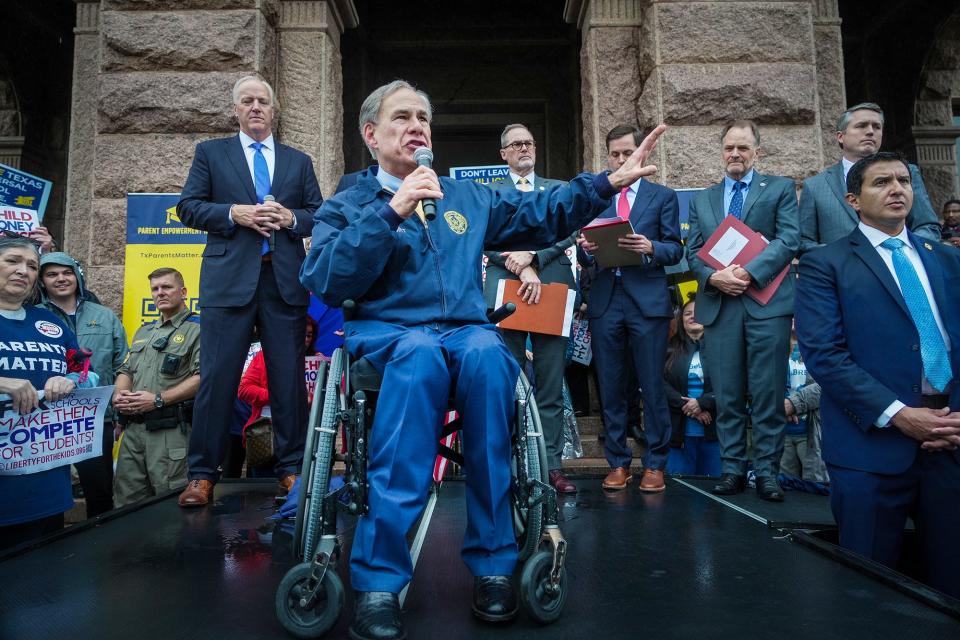With special session, Texas GOP leaders can claim victory on one very elusive issue
- Oops!Something went wrong.Please try again later.
AUSTIN — Ever since Republicans began their march to political supremacy in Texas in the mid-1990s, they have systematically achieved nearly all of their public policy goals and enacted them into law.
Abortion restrictions? Done and done many times over. Voter ID? Enacted after several stalled attempts. Crackdowns on unlawful immigration? An ongoing winning issue for the GOP. Redistricting maps to keep Republicans in power? Happens at least once every decade. And the list goes on.

However, one Republican priority that dates back to those days in the waning years of the 20th century that Democrats have managed to deny the GOP is the issue presently known as "school choice." It's also been called "parental rights" or "parental empowerment." The earliest preferred shorthand was "school vouchers." And the thread that runs through each euphemism is a policy that would use the power of government to offset the cost of K-12 private education for at least some of the Texas families wanting to go that route.
Each time the top Republican state leaders looked they were close to passing such a plan, Democrats found a way to deny them. But the out-of-power party didn't — and couldn't — do it alone. At the grassroots level, teachers organizations formed unlikely alliances with local superintendents and school boards. In the Legislature, many rural Republicans who'd have no qualms about steamrolling Democrats on abortion rights or voter ID locked arms with the opposition party to beat back anything resembling a vouchers plan.
Now comes the biggest test in the Republicans' nearly three-decade fight for school choice. It starts Monday when Gov. Greg Abbott calls lawmakers back to Austin, and he has vowed to keep them there until the school choice logjam finally breaks.
Generally speaking, the fulcrum at the center of the school-choice lever is money. School districts' funding is contingent on how many students show up in class each day. So for every student who enrolls in a private school or some other alternative to the public school, that's money that never arrives in local school district's treasury.
But their parents still must must pay their local school property taxes, which adds to the overall pot of money available, even if some of that is siphoned off by the state and distributed to other districts to comply with the Texas Constitution and the state law.
Under the Constitution, "it shall be the duty of the Legislature of the State to establish and make suitable provision for the support and maintenance of an efficient system of public free schools." The law that makes that happen is Chapter 48 of the Education Code, which guarantees "that each school district in the state has … adequate resources to provide each eligible student a basic instructional program and facilities suitable to the student's educational needs."
More: 'I'm here to win': Dade Phelan says he'll stay as House chief despite calls for new boss
So it stands to reason that if the state can ease a family's property tax burden, or find another public funding mechanism to make private school more affordable, there's a greater incentive to opt for a private education.
Going into the special session, which also includes the governor's call for action on even more border security measures and prohibitions on Texas employers requiring COVID-19 vaccinations, it would appear that at least the contours of the school-choice battle lines are drawn. The Senate during the regular session moved forward on the school choice front. The House did not.
In fact, in what was viewed as a test vote on the matter, 24 House Republicans in April sided with the Democrats on a rider added to the state budget that would prohibit using state funds to underwrite a voucher system.
Abbott, both during the regular session and even more so since, has shown a willingness to spend political capital to pass a school choice plan. But his direction to lawmakers for the 30-day special session appears more modest than some of the rhetoric we have seen from the governor on the topic. Here's how he framed what he wants to happen in the news release Thursday formally announcing the agenda:
"EDUCATION FREEDOM: Legislation providing education savings accounts for all Texas schoolchildren."
That hasn't stopped Democrats from describing Abbott's plan as a "voucher scam" repackaged and rebranded with a friendlier-sounding name. And teachers' groups have been arming for battle on the issue pretty much all year.
And so too are Abbott's allies with deep pockets and desire to see his efforts succeed. Political action organizations with righteous-sounding names like Texas Federation for Children and Defend Texas Liberty are seeking to mobilize conservative voters in the effort to peel away the Republicans who formed the situation alliance with the Democrats.
On other matters important to him, Abbott has demonstrated that he's not unwilling to play hardball. During the regular session, legislation that would have provided pay raises for teachers didn't make it to the finish line. Legislation to revive the teachers' pay proposal was not included by Abbott on lawmakers' to-do list. It could added, but perhaps not until there's a deal on "education freedom."
And if that deal is reached, Republicans, under Abbott's leadership, can finally put a check mark next to one of the few priorities that have eluded them since they consolidated their power in Austin all those years ago.
John C. Moritz covers Texas government and politics for the USA Today Network in Austin. Contact him at jmoritz@gannett.com and follow him on X, formerly called Twitter, @JohnnieMo.
This article originally appeared on Corpus Christi Caller Times: Why hasn't Texas GOP majority been able to enact a school choice plan?

